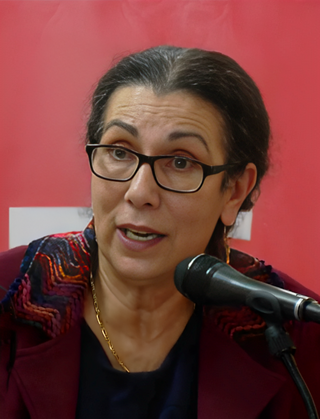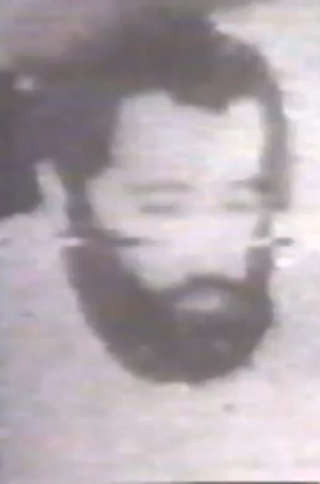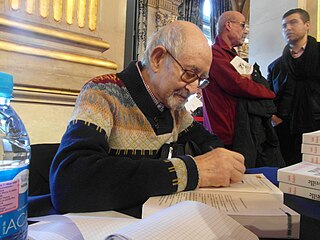Related Research Articles

The Algerian People's National Army is the military force of Algeria. It is the direct successor of the National Liberation Army (ALN), the armed wing of the nationalist National Liberation Front, which fought French colonial rule during the Algerian War of Independence (1954-1962).
The History of Algeria from 1962 to 1999 includes the period starting with preparations for independence and the aftermath of the independence war with France in the 1960s to the Civil War and the 1999 presidential election.

The Democratic National Rally is a political party in Algeria. The party held its Second Congress on 15–17 May 2003.

The Movement of Society for Peace, sometimes known by its shortened form Hamas, is a Sunni Islamist party in Algeria, led by Mahfoud Nahnah until his death in 2003. Its current leader is Abderrazak Makri. It is an offshoot of the Muslim Brotherhood.

The Islamic Salvation Front was an Islamist political party in Algeria. The party had two major leaders representing its two bases of its support; Abbassi Madani appealed to pious small businessmen, and Ali Belhadj appealed to the angry, often unemployed youth of Algeria.

The National Liberation Front commonly known by its French acronym FLN, is a nationalist political party in Algeria. It was the principal nationalist movement during the Algerian War and the sole legal and ruling political party of the Algerian state until other parties were legalised in 1989.

Louisa Hanoune is the head of Algeria's Workers' Party. In 2004, she became the first woman to run for President of Algeria. Hanoune was imprisoned by the government several times prior to the legalization of political parties in 1988. She was jailed soon after she joined the Trotskyist Social Workers Organisation, an illegal party, in 1981 and again after the 1988 October Riots, which brought about the end of the National Liberation Front's (FLN) single-party rule. During Algeria's civil war of the 1990s, Hanoune was one of the few opposition voices in parliament, and, despite her party's laicist values, a strong opponent of the government's "eradication" policy toward Islamists. In January 1995, she signed the Sant'Egidio Platform together with representatives of other opposition parties, notably the Islamic Salvation Front, the radical Islamist party whose dissolution by military decree brought about the start of the civil war.
Abbassi Madani was an Algerian politician who was the President of the Islamic Salvation Front. As its leader, he became the voice of a large part of the dispossessed Algerian youth.

The Socialist Forces Front; is a social democratic and secularist political party, mainly supported by Berbers in Algeria. The FFS is a member of the Socialist International and the Progressive Alliance. It led an unsuccessful rebellion against the Algerian government from 1963 to 1964.

Berberism is a Berber political-cultural movement of ethnic nationalism, started mainly in Kabylia (Algeria) and in Morocco later spreading to the rest of the Berber communities in the Maghreb region of North Africa. The Berberist movement in Algeria and Morocco is in opposition to cultural Arabization, the pan-Arabist political ideology and Islamism.

The Algerian Civil War, known in Algeria as the Black Decade, was a civil war fought between the Algerian government and various Islamist rebel groups from 11 January 1992 to 8 February 2002. The war began slowly, as it initially appeared the government had successfully crushed the Islamist movement, but armed groups emerged to declare jihad and by 1994, violence had reached such a level that it appeared the government might not be able to withstand it. By 1996–97, it had become clear that the Islamist resistance had lost its popular support, although fighting continued for several years after.

Mustafa Bouyali was the leader of the Algerian Islamic Armed Movement, a guerrilla group based around Larbaa south of Algiers, from 1982 to 1987.
The Algerian Civil War was an armed conflict in Algeria between the Algerian Government and multiple Islamist rebel groups, sparked by a military overthrow of the newly elected Islamist government. The war lasted from December 1991 until February 2002, though in the south of the country an Islamist insurgency remains ongoing.

Parliamentary elections were held in Algeria on 5 June 1997. The result was a victory for the National Rally for Democracy (RND), a new party created in early 1997 for President Zéroual's supporters, which won 156 out of 380 seats. They were followed by the Movement of Society for Peace with 69 seats, the National Liberation Front (62), and the Islamist Islamic Renaissance Movement (34). The two Berberist parties, FFS and RCD, got 20 and 19 seats respectively. Views on this election were mixed; most major opposition parties filed complaints, and the success of the extremely new RND raised eyebrows. The RND, FLN, and MSP formed a coalition government, with the RND's Ahmed Ouyahia as prime minister.
Anwar Haddam was a leader of the Islamic Salvation Front (FIS), an Islamist party in Algeria, and was elected to parliament on a FIS ticket in 1991 - Algeria's first multiparty elections. The dissolution of the FIS by military decree after its electoral victories in 1991-92 triggered the Algerian Civil War. Haddam spent most of the war years in exile in the United States of America, acting as a main figure in the party's political leadership. Algerian authorities unsuccessfully sought his extradition.

Sadek Hadjerès was an Algerian politician of the Algerian Communist Party.

Parliamentary elections were held in Algeria on 30 May 2002 to elect members of the People's National Assembly. The governing National Liberation Front (FLN) won a majority of seats in the election. The election suffered from a low turnout, violence and boycotts by some opposition parties.
Abdelhamid Mehri was an Algerian resistance fighter, soldier and politician.
Mohamed Salah Sid, is an Algerian-born British radio broadcaster, producer and voice-over artist who has worked for the British Broadcasting Corporation in the United Kingdom for most of his career.

Parliamentary elections were held in Algeria on 10 May 2012. The incumbent coalition, consisting of the National Liberation Front (FLN) of President Abdelaziz Bouteflika and the National Rally for Democracy (RND) of Prime Minister Ahmed Ouyahia, held on to power after winning a majority of seats. The Islamist parties of the Green Algeria Alliance lost seats.
References
- 1 2 Naylor, Phillip Chiviges (2000). France and Algeria: A History of Decolonization and Transformation. Gainesville: University Press of Florida. p. 218. ISBN 9780813018010.
- ↑ Khatib, Sofiane (Winter 2005). "Spoiler Management During Algeria's Civil War: Explaining the Peace". web.stanford.edu. Retrieved 2017-03-17.[ permanent dead link ]
- ↑ Volpi, Frédéric (2003). Islam and Democracy: The Failure of Dialogue in Algeria. Pluto Books. p. 74. ISBN 9780745319766. JSTOR j.ctt18fsc4c.
- ↑ Naylor, Phillip Chiviges (2000). France and Algeria: A History of Decolonization and Transformation. Gainesville: University Press of Florida. p. 218. ISBN 9780813030968.
- ↑ Naylor, Phillip Chiviges (2000). France and Algeria: A History of Decolonization and Transformation. University Press of Florida. p. 219. ISBN 9780813030968.